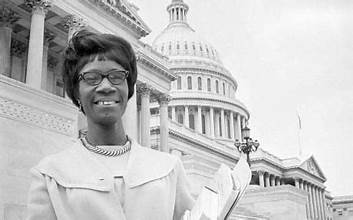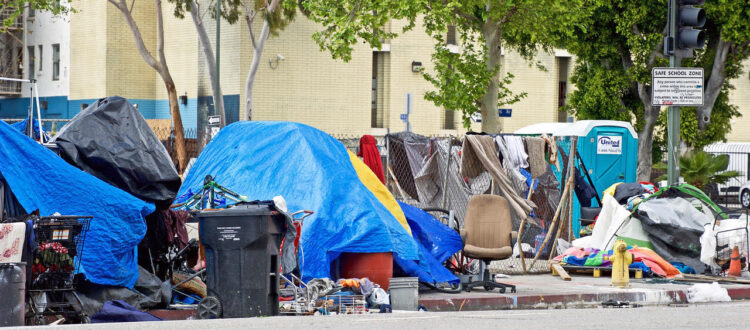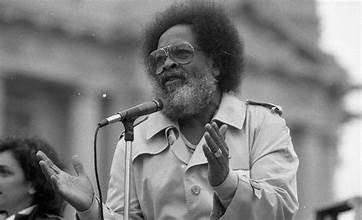Bo Tefu | California Black Media
Sen. Laphonza Butler Introduces Bill to Honor Rep. Shirley Chisholm With Congressional Gold Medal, Statue
U.S. Sen. Laphonza Butler (D-Calif.) announced last week she is co-sponsoring a bipartisan bill to honor Shirley Chisholm, the first African American woman elected to the United States Congress.
Butler, the only Black woman currently serving in the U.S. Senate, and Sen. Raphael Warnock (D-GA.) proposed the legislation to posthumously endow Chisholm with Congress’s highest award in commemoration of her accomplishments, activism, and legacy.
If the bill passes, Congress will present Chisholm, who was elected in 1968 to represent New York’s 12th District in the United States Congress with the Congressional Gold Medal. A statue of Chisholm will also be erected in the U.S. Capitol in her memory.
“Shirley Chisholm left a mark on our nation’s history that demands its own recognition,” Butler said.
“She was a trailblazer — the first Black woman elected to the U.S. House of Representatives and the first to run for President — who opened doors for generations of Black women,” Butler added.
Chisholm, a lifelong public servant, worked in education and social services before being elected as the second African American to the New York State Assembly in 1964. She is remembered as a passionate leader who advocated for women and minorities through legislation she introduced and supported.
Warnock said Chisholm’s legacy inspired him to fight for the rights and well-being of Black Americans.
“Shirley Chisholm broke barriers for Black women, Black Americans, and any American who refuses to be confined by injustice,” Warnock said.
“As an educator, and a trailblazing Congresswoman and presidential candidate, she fought for an inclusive democracy, one that lives up to our nation’s highest ideals of equity and justice under law,” he added.
Legislative Republicans Condemn “Antisemitic Campus Disruptions;” Call for Reduced Funding
On May 1, California Republican lawmakers held a press conference at the State Capitol in Sacramento to denounce protests organized against the Israel-Palestine conflict that have been occurring at universities around California.
The lawmakers, led by Assembly Republican Leader James Gallagher (R-Yuba City) and Senate Minority Leader Brian Jones (R-San Diego), called the demonstrations “Antisemitic campus disruptions” that have interrupted the finals weeks of the semester at college campuses statewide.
The Republicans called on university administrators to “restore order” on campus for students to continue with their classes. Gallagher and Jones also floated the idea of cutting state-funded grants for students found guilty of engaging in unlawful activities and reducing funding to universities whose leaders fail to take decisive action.
“Their failure to control the illegal protests is unacceptable, particularly considering the substantial taxpayer funding allocated to our public universities,” said Jones. “If the Administrations continue to allow this lawlessness, we must take action to reduce or rescind their state funding. Taxpayers should not be bankrolling administrations that falter in upholding law and order on campus.”
Gallagher said that university administrators and Gov. Gavin Newsom have allowed the protests to escalate and have not taken action to prevent violence and unlawful behavior.
“Enough is enough. It’s time to stop enabling the radicals who think they are entitled to take over public spaces and stop people from getting an education,” Gallagher said.
“It’s time to end the lawlessness,” he said.
LAPD officers arrested demonstrators at the University of California Los Angeles campus. The police also cleared an encampment set up by the demonstrators at the UCLA campus.
Gov. Newsom condemned the violence that erupted between law enforcement and UCLA students.
“The right to free speech does not extend to inciting violence, vandalism, or lawlessness on campus,” he said.
The Republicans stated that Jewish students have been intimidated on campus and prevented from going to class. They called on university administrators to stop canceling classes and suspend demonstrators with real consequences or prosecution.
“The First Amendment guarantees your right to petition your government, it does not guarantee you the right to interfere with the free expression or freedom of assembly of others,” Jones said.
“College campuses must ensure a safe environment for all, regardless of their beliefs,” he said.
PPIC Report Gives Update on California’s “Capacity to House Its Homeless”
California’s permanent housing and emergency shelter capacity programs are struggling to meet the homeless population’s growing housing needs, a Public Policy Institute of California (PPIC) report stated.
California has launched several programs to mitigate its homelessness crisis – the worst in the nation — which was exacerbated by the COVID-19 pandemic. According to the report, federal funding helped the state increase emergency shelter beds by 34% during the pandemic. However, the shelters only provided temporary housing for people experiencing homelessness.
The PPIC stated that the increase in homelessness indicates that California needs to expand housing programs to accommodate the growing population.
The “programs that can prevent and mitigate homelessness and housing instability are more urgently needed than ever,” the PPIC stated.
Across California, there remains a shortage of beds in shelters for unhoused people. The report estimates that the state has more than 180,000 homeless people but only about 70,000 beds, accounting for an overall shortage of nearly 110,000 beds.
The state’s struggle to provide permanent housing persists despite establishing partnerships with community-based organizations to tackle the problem.
California’s government has spent billions to increase capacity, but the rising cost of living and limited progress has made it difficult to get rid of homelessness. Local governments have also struggled to track city spending and provide accurate audits of housing programs.
A major concern for the state, according to the report, is that local governments are running out of pandemic-related relief funds. This has led to a decline in the number of beds funded by the Emergency Solutions Grants – Coronavirus (ESG-CV) program. Local governments have urged the state to increase funding for city housing programs, but city officials are yet to establish a reliable method to monitor and evaluate the effectiveness of existing programs.
California Sees Population Increase for First Time in Three Years
California, the country’s most populous state, saw an increase of state residents in 2023, reversing a declining trend over the past three years.
The state’s population grew by over 67,000 people, according to the California Department of Finance (DOF). Currently, the state has a population of 39.1 million people.
The most notable population increases happened in 31 counties, with the most significant growth occurring in the Bay Area, Central Valley, and the Inland Empire.
Gov. Gavin Newsom attributed the population growth to an increase in immigrants relocating to California and a slower mortality rate following the COVID-19 pandemic.
“With the improvement of federal legal immigration processing backlogs, rebounding legal immigration levels – not including people seeking asylum at the border – and mortality rates returning to long-term trends, a stable foundation for continued growth has returned,” the governor’s office stated.
“From the Inland Empire to the Bay Area, regions throughout California are growing – strengthening local communities and boosting our state’s future,” Newsom’s statement continued.
Recent state data indicated that the number of people moving out of state decreased since 2021 when many people migrated to other states during the pandemic.
The Department of Finance showed that housing production in cities such as Emeryville in the Bay Area helped drive population growth.
Before the recent surge in population, California experienced a record-low growth rate caused by the pandemic and deadly wildfires, the report states.
Thousands of people lost their homes, jobs, and in worse cases their lives. As the nation’s fifth-largest economy, The Department of Finance estimates that California will continue to experience positive population growth.
State Ed Chief Tony Thurmond Honored for Leadership in Holocaust, Genocide Education
The California Legislative Jewish Caucus honored state Superintendent of Public Information (SSPI) Tony Thurmond for his leadership in Holocaust and genocide education.
Thurmond was honored, along with leaders and educators from the Jewish Family and Children’s Services Holocaust Center, who shared Holocaust survival stories and contributed to the community’s educational initiatives.
“Through education, we not only honor the memory of the victims but also strive to ensure that such atrocities never happen again,” Thurmond said.
“By understanding the horrors of the past, we empower ourselves to build a future rooted in empathy, tolerance, and justice,” he said.
As the co-chair of the Governor’s Council on Holocaust and Genocide Education, Thurmond launched an oral history speaker series that shared the impactful stories of Holocaust survivors and their descendants. This initiative was created to counter claims that California’s education system provided limited information on the history of the Holocaust during World War II.
A national survey by the Claims Conference revealed that Millennials and Gen Z Americans lacked knowledge of the Holocaust.
According to the survey, nearly half of Millenial and Gen Z Americans failed to name one of the 40,000 ghettos and concentration camps created for the mass murder of Jews during World War II. The survey indicated that 63% of young Americans were ignorant of the fact that 6 million Jews were murdered in the Holocaust.
The oral history initiative marks the beginning of a series of survivor testimonies hosted by Thurmond and school districts statewide since it was started in January.
Various multicultural nonprofits and coalitions supported Senate Concurrent Resolution 135 proposed by Senator Scott Wiener to commemorate California Holocaust Memorial Day. The organizations that supported the resolution include the Asian Pacific Islander Caucus, The California Latino Legislative Caucus, The California Legislative Women’s Caucus, and the California Legislative Black Caucus.
California Offers $28.5 Million in Grants to Prevent Illegal Sale of Tobacco Products to Youth
The California Department of Justice announced on April 19 that it is accepting applications for its 2024-2025 Tobacco Grant Program.
California Attorney General Rob Bonta said the program aims to reduce the illegal sale of tobacco products. The state will provide approximately $28.5 million in grants to eligible local agencies.
Grant recipients are required to use the funding to help enforce state and local laws related to the illegal sale and marketing of tobacco products such as selling e-cigarettes to minors.
“Together with local law enforcement, we’re successfully collaborating and coordinating efforts to put a halt to the dangers of illicit tobacco products,” Bonta said.
We must continue to enforce California’s laws around tobacco products, and this funding will allow our communities to do just that, and hold those who violate the law accountable,” he said.
The 2016 California Healthcare, Research and Prevention Tobacco Tax Act, Proposition 56, has helped fund the program. The state has allotted approximately $285 million in grant funds to 406 local agencies through the program.
The grant program is committed to reducing childhood addiction to tobacco products by supporting local partners who:
- Enforce the statewide retail flavor ban and similar local retail flavor ordinances.
- Prosecute and penalize retailers who sell or market tobacco products to youth under the age of 21, including over the internet.
- Educate and inform tobacco retailers on state and local tobacco laws.
- Investigate and inspect retailer licensing compliance.
A 2023 survey by the Centers for Disease Control and Prevention, indicated that nearly 90% of youth who used e-cigarettes preferred flavored products. National data showed that companies produced and marketed tobacco products with various flavors to appeal to young people.
To submit an application, visit the Office of the Attorney General’s website.
Gov Newsom Declares May 2024 Small Business Month
On May 1, Gov. Gavin Newsom issued a proclamation declaring May 2024 Small Business Month.
“California’s more than 4.1 million small businesses – the most of any state – embody the entrepreneurial spirit that drives the economy of the Golden State,” stated the proclamation released by Newsom’s office.
“Small businesses and entrepreneurs accelerate economic growth and mobility in California, creating two-thirds of net new jobs, building wealth, innovating to solve global problems, launching future growth industries, and defining main streets across our local communities,” proclamation continued.
For Black Californians, business ownership remains low in the state, according to the Public Policy Institute of California (PPIC).
Across the Golden State, “14% of firms were owned by Latinos and about 2% were Black owned in 2021; these groups comprise 39% and 5% of the state workforce. Asian Californians are overrepresented, making up 23% of business owners and about 16% of the workforce,” the PPIC report states.
On X, Gov. Newsom posted an upbeat message celebrating Small Business Month, hailing small businesses for contribution the economy, across the and highlighting the importance of equity.
“California is the #1 state for new business starts and during Small Business Month, we recognize their tremendous contributions and the importance of supporting their success. We must ensure that the dream to start, manage, and grow resilient businesses in California remains accessible to all,” he posted.
California’s small businesses account for more than 98 percent of total businesses in the state and employ more than 7 million people – nearly half of the state’s private sector workforce. Our state leads the nation in business startups, and our businesses receive more than 50 percent of the nation’s venture capital with more than $104 billion invested in California in 2022, according to the Governor’s office.










